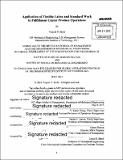| dc.contributor.advisor | Y. Karen Zheng and Sanjay E. Sarma. | en_US |
| dc.contributor.author | Modi, Vrajesh Y | en_US |
| dc.contributor.other | Leaders for Global Operations Program. | en_US |
| dc.date.accessioned | 2015-09-29T18:58:55Z | |
| dc.date.available | 2015-09-29T18:58:55Z | |
| dc.date.copyright | 2015 | en_US |
| dc.date.issued | 2015 | en_US |
| dc.identifier.uri | http://hdl.handle.net/1721.1/99025 | |
| dc.description | Thesis: M.B.A., Massachusetts Institute of Technology, Sloan School of Management, 2015. In conjunction with the Leaders for Global Operations Program at MIT. | en_US |
| dc.description | Thesis: S.M., Massachusetts Institute of Technology, Department of Mechanical Engineering, 2015. In conjunction with the Leaders for Global Operations Program at MIT. | en_US |
| dc.description | Cataloged from PDF version of thesis. | en_US |
| dc.description | Includes bibliographical references (pages 47-48). | en_US |
| dc.description.abstract | This thesis demonstrates the applicability of flexible labor and standard work in increasing labor productivity and improving quality in fulfillment center produce operations. Three hypotheses were tested: (1) labor productivity would be increased by implementing a flexible labor staffing model and shift-by-shift labor requirement projections; (2) additional labor productivity from redesigned products would be captured using the flexible labor staffing model with updated projections; and (3) product quality would be improved by defining and refining standard work for inspection processes and optimizing inspection frequency. Indeed, implementation of flexible labor generated an average 44% productivity improvement. Furthermore, introducing redesigned products and updating projections generated an additional average 16% productivity improvement. While stalled implementation of standard work made it difficult to show that standardizing inspection processes and optimizing inspection frequency improves product quality via improved inspection consistency, the project did identify several produce categories that did not require inspection and established a starting point to standardize inspection processes by documenting inspection best practices. During these changes, setting easily achievable targets that required an increase in performance improved team morale, while overly aggressive targets would have worsened morale and hindered implementation. AmazonFresh produce processes can be further improved by ensuring the Produce Receive function serves as a "first line of defense" against quality issues, redesigning more products to reduce downstream labor requirements, implementing standard work in inspections, experimenting with lower bin inspection frequencies, institutionalizing quality and productivity metrics, and deploying changes across all AmazonFresh sites. Concurrently, AmazonFresh leadership may consider installing an incentive system that supports productivity and quality improvements, create roles within the central organization to support process improvements, and incorporate volume and service level requirements when designing new sites. Finally, future research opportunities include observing the effect of inspection frequency on inspector performance and assessing whether recent advances in sensor and conveyance technology can improve or replace existing processes. | en_US |
| dc.description.statementofresponsibility | by Vrajesh Y. Modi. | en_US |
| dc.format.extent | 48 pages | en_US |
| dc.language.iso | eng | en_US |
| dc.publisher | Massachusetts Institute of Technology | en_US |
| dc.rights | M.I.T. theses are protected by copyright. They may be viewed from this source for any purpose, but reproduction or distribution in any format is prohibited without written permission. See provided URL for inquiries about permission. | en_US |
| dc.rights.uri | http://dspace.mit.edu/handle/1721.1/7582 | en_US |
| dc.subject | Sloan School of Management. | en_US |
| dc.subject | Mechanical Engineering. | en_US |
| dc.subject | Leaders for Global Operations Program. | en_US |
| dc.title | Application of flexible labor and standard work in fulfillment center produce operations | en_US |
| dc.type | Thesis | en_US |
| dc.description.degree | M.B.A. | en_US |
| dc.description.degree | S.M. | en_US |
| dc.contributor.department | Leaders for Global Operations Program at MIT | en_US |
| dc.contributor.department | Massachusetts Institute of Technology. Department of Mechanical Engineering | |
| dc.contributor.department | Sloan School of Management | |
| dc.identifier.oclc | 921306927 | en_US |
